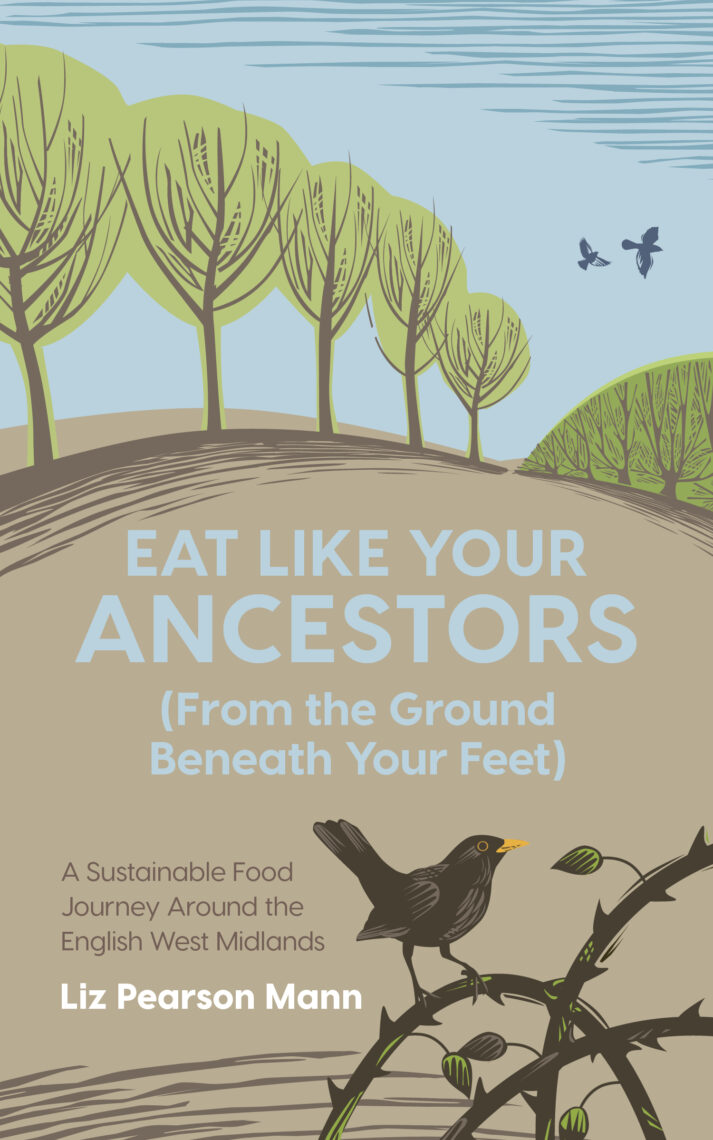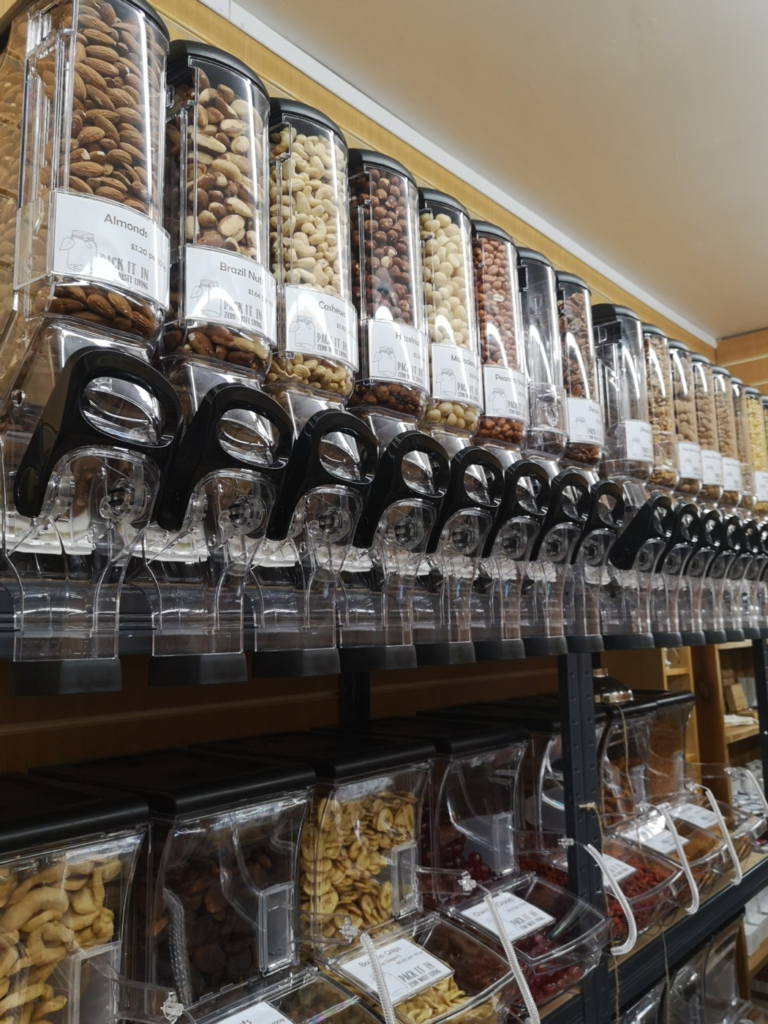I’ve been looking for bulk bin buying options to avoid plastic waste when food shopping for a while now, but my nearest stores have been around 30 miles away. However, we now have a zero waste shop in Worcester, where I live, called Pack It In Zero Waste Living.
Marvellous! It opened on Saturday in the Old Market Hall, a place I’ve been frequenting for a while now. I’ve been going to the butchers, cheesemonger and the haberdashery in the market. It’s old-fashioned shopping which has helped me to shop plastic-free, and buy some locally produced food. Now the old market has added another destination for plastic-free shopping.
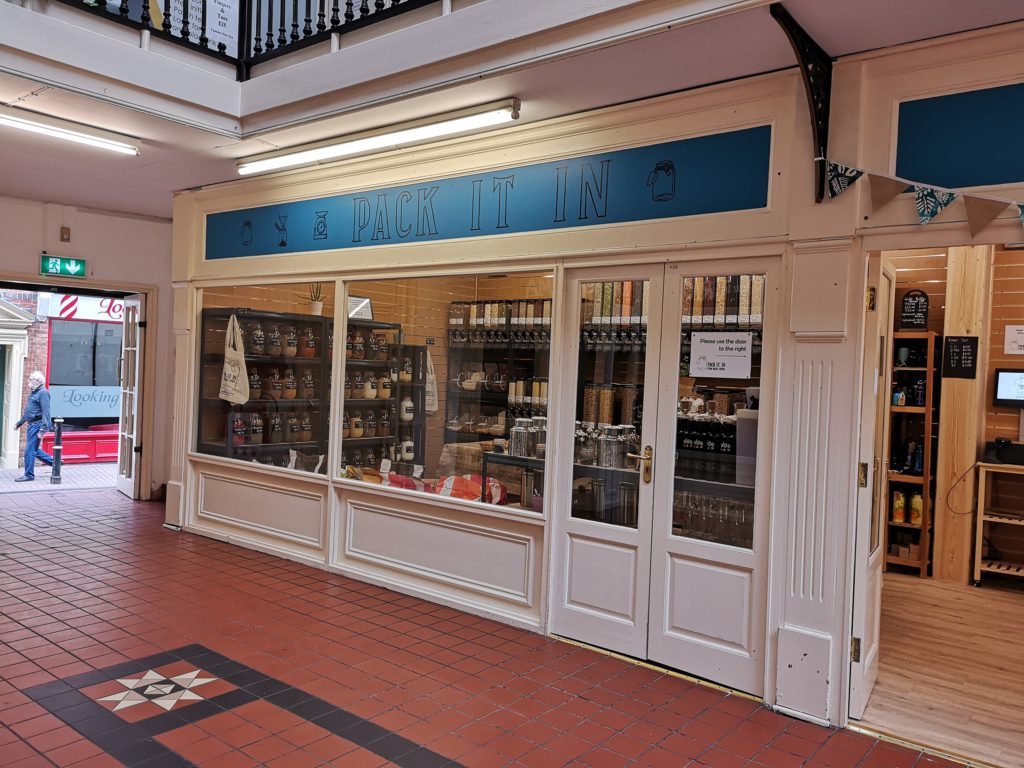
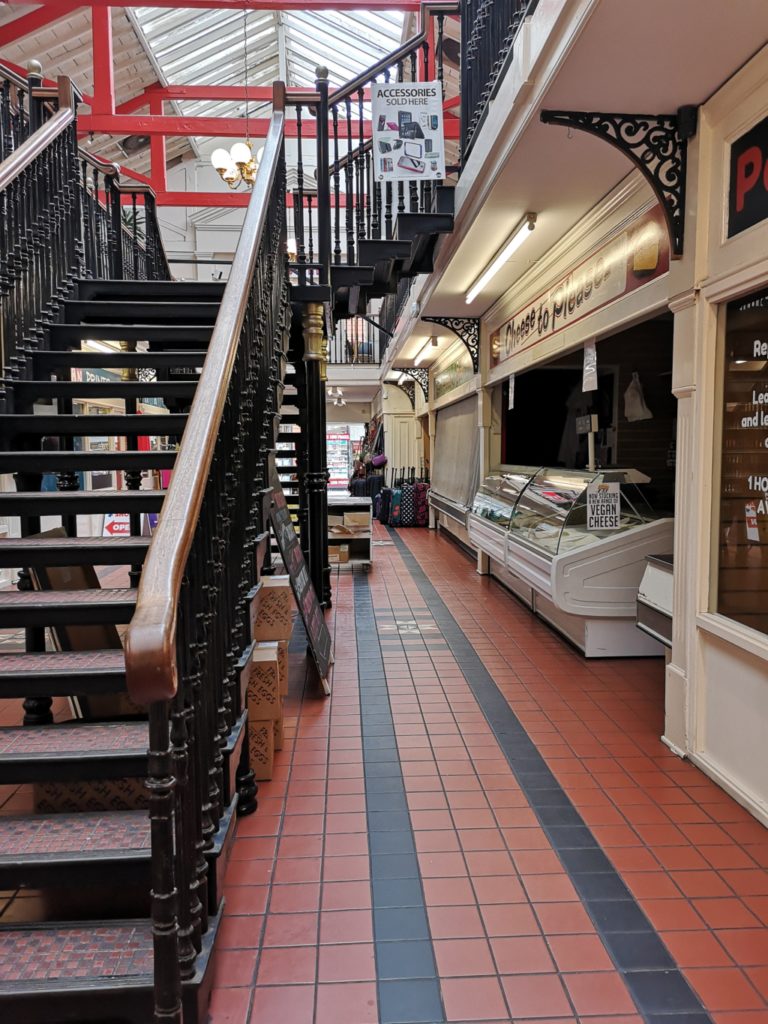
Philippa Gilfillan, the owner of the new zero waste shop was a primary school teacher for 22 years, but has given up teaching to open this shop. After doing her best to embrace a zero waste lifestyle, and avoid plastic as much as possible, she realised that there was only so far she could go. Without a bulk bin store locally, options were limited for buying food and other goods plastic-free. So, she decided she could do this herself. After a start-up loan and a crowdfunding campaign, here we are.
Why Do We Need Bulk Bin Stores?
We’ve probably all heard the prediction that we could have more plastic than fish in our oceans by 2050. We see photos on the news of beached sea animals, their stomachs full of plastic. Plastic fragments have even been found in 50% of freshwater insects in South Wales. David Attenborough’s Blue Planet 2 focused on the toxic plastic soup in our oceans in December 2017, and caught the attention of the world. They’ve all had their affect on us, but still we face a sea of plastic when we shop at supermarkets and convenience stores.
There are ways to avoid plastic waste without a bulk bin store, but it takes time to find alternatives and determination, if nothing else. When I began to think about this, I had the advantage that I can remember times when there was much less plastic around than there is now. In my mind I went on shopping trips with my late Nan and mum. If you want, join me for some plastic-free shopping 1970s style on a shopping trip with my nan. Follow this with my quest for unpackaged food revolution, loose-leaf tea stories, with my mum. It might be an eye opener to remember, or encounter the food packaged in paper, glass, tin and card and the ‘granny’ shopping tactics that can avoid plastic waste.
What’s in the New Zero Waste Shop in Worcester?
Pack It In Zero Waste Living has…….
- Nuts, cereals, dried fruit and pasta, flour and spices
- Oils, like olive oil and rapeseed oil
- Non-food goods like eco washing-up liquid, laundry liquid, steel straw, bamboo toothbrushes etc
- Loose leaf tea
One favourite is loose leaf tea and coffee. It doesn’t take much for me to get tea withdrawal symptoms. When I heard, some months ago, that tea bags contain plastic in the mesh bag, it was a straight-forward decision to go back to the loose-leaf tea habit of my childhood. Only, I still found it difficult to get loose-leaf tea without the plastic bag inner in the box. Foxed, everywhere I turned! There were some places where I could find loose-leaf tea from a tea bin, but the options were some distance away. Now I have plastic-free loose-leaf tea on my doorstep.
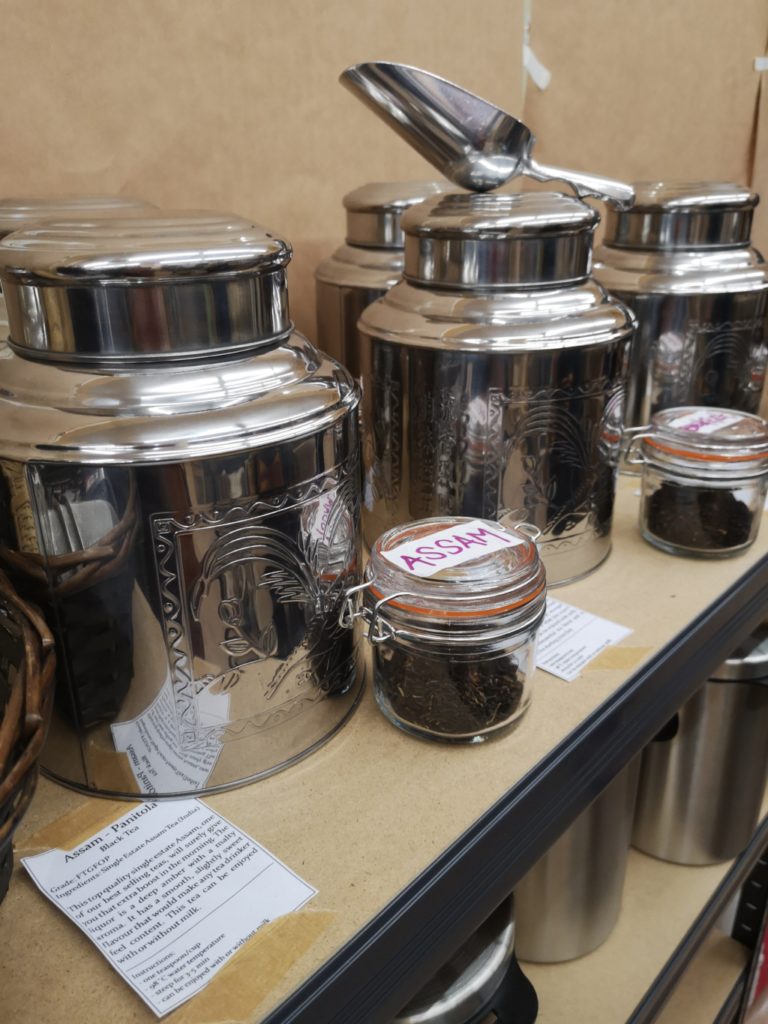
The Pack It In shop sells goods that are useful for a zero waste lifestyle; such as bamboo toothbrushes, steel straws, palm-free or sustainable palm oil soap, beeswax wrap and produce bags (beeswaxed or unwaxed fabric).
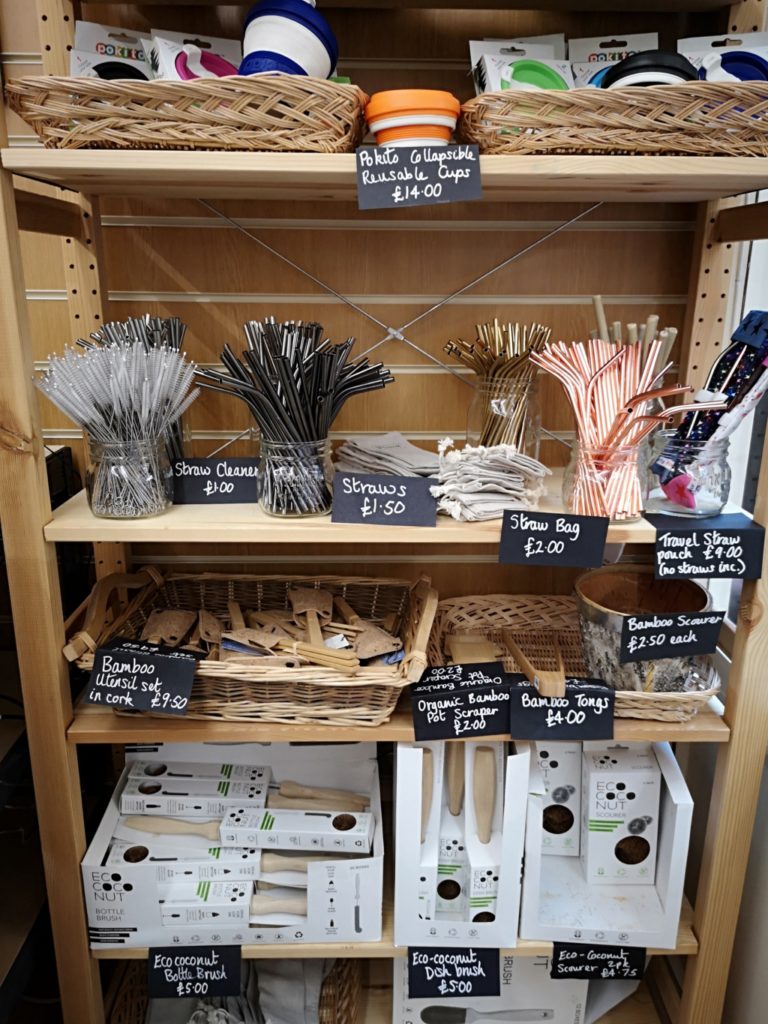
Bulk bin stores are an old fashioned shopping experience but modernised. Buy the quantity you want and bring your own bags or containers. Just like shoppers always used to do – but serve yourself. We’re now so used to self-serve shopping that it makes sense, at least for certain types of food. It also helps to move customers through the shop.
The Worcester store will also be running workshops, such as Cookery, DIY beauty and cleaning products, candle-making, and sewing.
Are Bulk Bin Stores Affordable?
That question that will be on most people’s minds is ‘is this affordable for me?’ After all, they are a specialised store in a world dominated by supermarkets and chainstore convenience shops. The shop in Worcester has been set up to be affordable. Here are some reasons why bulk bin stores are more affordable than you might think:
Avoid Food Waste and Save Money
You also have the opportunity to save money by buying only as much as you need. Even if much of the food is dry food, this still can go stale if you forget about it and leave it at the back of the cupboard for too long. How many of us have thrown away nuts and cereals because they have gone a little stale? Not wasting food saves you money.
Budget Easier and Save Money
Only buying as much as you need can help you to budget. It normally pays to buy big packets to get lower prices. Supermarkets also tempt us with BOGOF offers (Buy One Get One Free). We can then easily find we spend more in one week or a month than we would like, just to buy cheaper. In a bulk bin store, where you buy what you need, you can find it easier to keep to a spending limit.
Save Space in Your Kitchen
Most of us don’t have the spacious kitchens that we see in home decor magazines. We see big banks of wall units in glossy photos, and a central island of cupboards with inset sink, and wish we had the same.
You may not have the kitchen of your dreams. If you buy at a bulk bin store, though, you can buy the quantity that fits your storage space. It’s ideal with those who are short of space.
Even with a reasonable amount of storage space, with too much food stored you may not be able to see the wood for the trees. You may find it harder to see what to use up. The answer may be to buy less, and use it up.
Bulk bin Stores Across the UK
Bulk bin stores are still rare in the UK compared to the US, but new stores are opening up. I haven’t been able to find a comprehensive online directory yet. My nearest have been The Clean Kilo in Birmingham and some bulk bin options in Indigo Wholefoods in Moseley, Birmingham. More well known are Alligator Wholefoods in York and The Zero Waste Shop in Totnes, Devon.
More options for the UK are listed by The Zerowaster. This includes shops and markets that have some options to by loose or refill – often wholefood outlets.
I Don’t Have a Bulk Bin Store Near Me – What Do I Do?
If you don’t have a bulk bin store near you, there are more options to buy food and drink loose or refillable than you might think. We’ve become so used to buying everything plastic-packaged at supermarkets that we can forget the options. The more obvious would be:
- Loose fruit and veg in supermarkets – squeezed out for plastic-packaged, ask for more!
- Traditional grocers, butchers, bakers and delicatessens – a dying breed, unless we support them!
- Markets and farm shops
Plastic-free Pantry is an online store selling wholefoods, and dried pantry staples that you would find in a bulk bin store. Listen to a podcast with the founder, Kim Tew and podcaster Jen Gale of Sustainable-ish here.
Future Development?
We’re now paying more attention to the problem that plastic packaging is causing. We might hope that bulk bin shops, and the opportunity to buy loose and to refill, should become more common. Supermarkets might also start up bulk bin and refill stations. What will happen to independent bulk bin stores then?
Perhaps independent stores might lead the way in selling organic and local. Some shops sell organic produce and some don’t. Organic and local are other aspects of food that seem to be neglected on social media.
Organic, Local and Seasonal and More
As well as stores like the Pack It In, buying naturally-preserved nutrient-dense food, from small producers that are local, or at least in your own country, helps avoid shipping food around the world. Food like cheese and dry-cured meats are part of our long-lived food cultures for a reason. They got us through the year, alongside the ‘local and seasonal’. This is Traditional Food Storage – Fridge Freezer Free.
We’re increasingly turning to food imported over long distances, often half-way round the world, causing problems for local communities elsewhere. We’re hearing about the Quinoa boom going bust in the Andes . It’s just one problem in a list of many that are surfacing.
Perhaps we can focus on more local alternatives, and appreciate the importance of organic; or food from small, family farms and small food businesses? It’s a systemic change that needs to happen, but we may be lucky enough to play our part.
Local food – suited to your local landscape, and food grown without ‘big ag’ chemicals are what I’m thinking of next.
If you’ve enjoyed this post, you may like to know about my book Eat Like Your Ancestors. It’s a sustainable food journey around where I live, but it’s relevant anywhere. And, it’s out now…..
